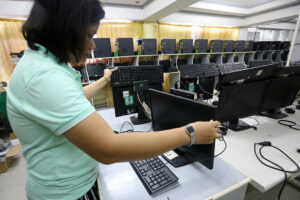THE DEPARTMENT of Information and Communications Technology (DICT) is aiming to increase the share of the digital economy to gross domestic product (GDP) to 12.5% by 2028, by fast-tracking digital infrastructure projects and attracting more hyperscalers to operate in the country.
“We are not settling for linear growth. We are aiming, as the President says, for hyperexponential growth. We are targeting a rocket ship trajectory to 12.5% (of GDP) by 2028,” DICT Secretary Henry Rhoel R. Aguda said during the Pilipinas Conference 2025, a forum hosted by Stratbase ADR Institute, on Thursday.
The digital economy’s contribution to the Philippine economy was little changed at 8.5% in 2024 from 8.6% in 2023. However, its share to GDP has steadily declined from the peak of 9.2% in 2021.
“The Philippines is in a state of digital decline. We are falling behind,” he said.
“Every point we lose is a missed chance for better jobs, higher income, and a future where every Filipino can take part in the digital age.”
According to the Philippine Statistics Authority’s definition, the digital economy is composed of digital transactions covering digital-enabling infrastructure, e-commerce, digital media and content, and government digital services.
Mr. Aguda noted that the Philippines had already missed its opportunity to fully digitalize, and was overtaken by Southeast Asian neighbors like Vietnam, where the digital economy accounts for 18.3% of its GDP, and Malaysia, where the digital economy makes up 23% of GDP.
“While we were comfortable, our neighbors were hungry… While the rest of the ASEAN (Association of Southeast Asian Nations) took advantage of the pandemic to digitize, we did not,” Mr. Aguda said.
The DICT chief said many hyperscalers, or major tech firms that build massive data centers to support cloud computing, artificial intelligence (AI), and high-volume digital workloads, are bypassing the Philippines in its expansion plans.
China and Indonesia are hosting six of the largest hyperscalers, while five are operating in Singapore and Malaysia, he added.
“We are lagging and this has to change,” Mr. Aguda said. “We need to make the Philippines the logical landing point of data in Asia.”
The government has set an ambitious target to increase its data center capacity to at least one gigawatt from the current 200 megawatts, the DICT said earlier.
While the Philippines’ talent pool and location can attract hyperscalers, Mr. Aguda said there is a need to improve connectivity infrastructure and digital adoption.
“Many of our companies have not adopted digital economy practices. We are still running analog businesses in a very digital world,” he noted. “That is a recipe for obsolescence.”
To achieve this, the DICT said it is cutting red tape to roll out its National Fiber Backbone to ensure free internet access nationwide. It is also looking to drive digital adoption across industries, and is institutionalizing cybersecurity and governance to protect the country’s critical infrastructure.
The DICT is also aiming to boost digital adoption through integrated government services in its eGovPH Super App. It is also looking to support more startups and further push for AI adoption in government, Mr. Aguda said.
“To attract the hyperscalers who have passed us by, we must give them more than just bandwidth. We must give them security and resilience,” Mr. Aguda said.
On the sidelines of the event, Stratbase ADR President Victor Andres “Dindo” C. Manhit emphasized the need to safeguard the country’s cybersecurity.
“As we move into a more digital economy, we need to secure the digital space. If not, the general population, private companies, and government agencies might be vulnerable,” he said.
In 2024 alone, the Philippines recorded 1.8 million cases of on-device cyberattacks against businesses, making it the third-most attacked county in Southeast Asia, according to global cybersecurity firm Kaspersky.
Mr. Manhit said that the country’s young, tech-savvy population could help the Philippines catch up with its neighbors in growing its digital economy.
Meanwhile, Mr. Aguda said he is in talks with the Philippine Stock Exchange (PSE) to ease listing requirements for technology startups.
“We have a lot of tech startups in the Philippines that have been waiting, for the longest time, to be able to raise money in our capital markets,” he told reporters on the sidelines of the forum.
He said that many Philippine tech startups, especially in industries like blockchain and digital wallets, are ripe for public listing.
“If we are able to fix the listing rules — and PSE said it is definitely open — and then we get underwriters to fund the initial public offering… I’m confident that next year, that there’s startups who will list,” Mr. Aguda added. — Beatriz Marie D. Cruz

















